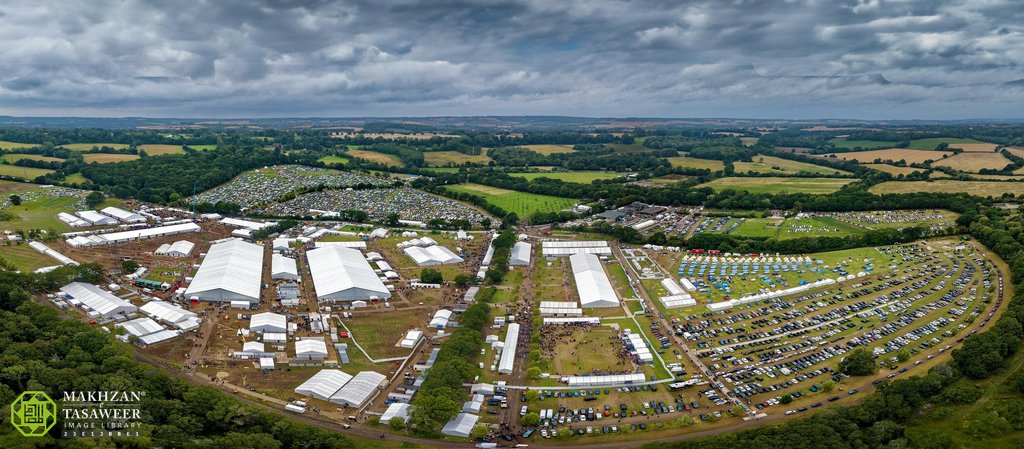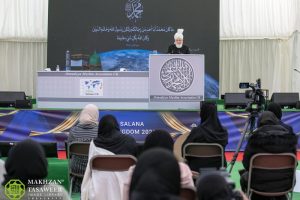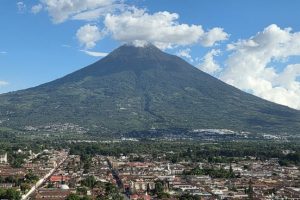
Tens of thousands of Ahmadi Muslims will gather in Alton, Hampshire this July on Friday 25th, Saturday 26th and Sunday 27th. Do not worry, our intentions are peaceful. You can check by coming over; people from all faiths (and none) are welcome to attend our Annual Gathering, which we have held almost every year in the UK since 1964.
If you do decide to attend, you’ll likely hear quite a lot of unfamiliar terminology being used. This won’t just be because there will be Ahmadis from all over the world who will be speaking a variety of languages; there are certain terms that are familiar to all Ahmadi Muslims irrespective of ethnicity or nationality, but that people from outside our community will be unfamiliar with.
You’ll hear one word in particular quite a lot: ‘Jalsa’.
The word ‘Jalsa’ literally means ‘Gathering’ but among Ahmadi Muslims this word is typically only used for religious gatherings of some sort and is not used in any other context e.g. the term is never used for an informal gathering of friends or family.
The word ‘Jalsa’ often appears alongside ‘Salana’ in the phrase ‘Jalsa Salana’ (‘Annual Gathering’) with is more formal and is used to refer to the event in a more official way e.g. ‘Jalsa Salana UK 2025’. Both terms come directly from Urdu; ‘salana’ (‘سالانہ’) means ‘annual’ and is derived from the Urdu word ‘saal’ (‘سال’) meaning ‘year’ which comes from Persian ‘saal’ (‘سال’) also meaning ‘year’. Likewise, Persian also has a corresponding word ‘salaneh’ (‘سالانه’) which also means ‘annual’.
Now the story of the word ‘Jalsa’ is a lot more interesting; to understand why, you have to appreciate that, for Ahmadi Muslims, our Jalsa is a period of heightened spiritual and physical activity. It’s a very blessed period for us and also a busy one; there’s a lot of events and speeches, lots of people, lots of exhibitions, lots of travelling to get there, and lots of Ahmadis volunteer to do the work that makes everything happen.
So in our minds ‘Jalsa’ is strongly associated with connotations of activity, effort, movement, spiritual energy and the presence of lots of people.
Which is why it can be so surprising to learn that the word originates from the Arabic triliteral root ‘j-l-s’ meaning ‘sit’.
Of course, we do sit down to listen to speeches, and in particular the blessed addresses delivered by His Holiness Hazrat Mirza Masroor Ahmad (aba), the Fifth Caliph of the Ahmadiyya Muslim Community. But the key aspect of that is the listening part and not the sitting part. So how did the name of an event that is characterised by an atmosphere of excitement and spiritual energy originate from such an inactive word like ‘sit’?
From the root ‘j-l-s’, Arabic derived the word ‘jalsah’ (‘جلسة’) which has a range of meanings, including but not limited to: ‘sitting’, ‘session’, ‘meeting’, ‘gathering’. Naturally, ‘jalsah’ started out as ‘sitting’ but since people often like to sit together, over time the meaning evolved so that it could refer to sessions, meetings, and small gatherings of people.
From Arabic, ‘jalsah’ entered Persian as ‘jalseh’ (‘جلسه’) with a similar range of meanings like ‘meeting’ and ‘gathering’. From Persian, the word ‘jalseh’ then came into Urdu as ‘jalsa’ (‘جلسہ’) with a range of meanings including: ‘sitting’, ‘meeting’, ‘social gathering’ and ‘assembly’. In Urdu, the word came to have broader and more public connotations such as ‘committee’ or ‘society’.
The Ahmadiyya Muslim Community was founded in 1889 in India by Hazrat Mirza Ghulam Ahmad (as) of Qadian, who claimed to be the Promised Messiah and Imam Mahdi. He initiated the first Jalsa in 1891 in the Indian village of Qadian. He used the Urdu word ‘jalsa’ to refer to the event. Hence all subsequent events came to be called as such and as Islam Ahmadiyyat spread all around the world, the word ‘Jalsa’ spread with it.
About the Author: Mansoor Dahri is an online editor for The Review of Religions. He graduated from UCL with a B.A. in Ancient Languages.




Add Comment